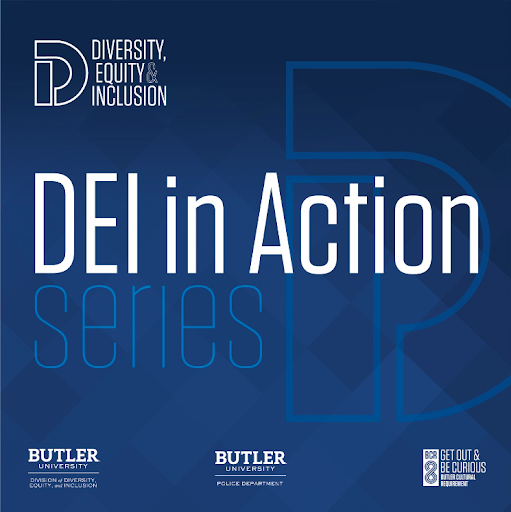The Division of Diversity, Equity and Inclusion has continued their DEI In Action Series to improve the university. Photo from @butlerdiversity on Instagram.
JULIA VERES | STAFF REPORTER | jveres@butler.edu
The Division of Diversity, Equity and Inclusion (DEI) hosted its fourth DEI in Action address in the Reilly Room on Friday, Nov. 9. The topic was “Supporting today’s college students and preparing for tomorrow’s” with a visiting speaker. Tia Brown McNair, the vice president of the Office of Diversity, Equity and Student Success and the executive director for the Truth, Racial Healing and Transformation campus centers at the American Association of Colleges and Universities.
The Division of DEI is going into its second year on Butler’s campus. The division’s mission is to provide the university with the guidance and strategies to become a more inclusive environment for students and staff alike and boasts a staff that has dedicated itself to finding new and innovative ways to improve life on Butler’s campus. In the last 16 months, the office has developed multiple strategic plans.
One such effort is the DEI in Action series. These series feature topics that the Division of DEI believes are important to both the world as well as those on campus. Each series focuses on a way to improve the overall campus experience for students and faculty. The keynote addresses are part of the series’ wider mission.
Danny Kibble, the senior executive director of DEI Initiatives and Engagement, has taken a central role in the organization of the DEI in Action series.
“[These programs will] really just depend on what are the most relevant needs of our campus and what is popping up today,” Kibble said. “[Anti-Semitism and Islamophobia: Understanding Their Real Impacts] wasn’t necessarily on our radar until October of 2023 but because we saw there was such a need, we developed a program to meet that need.”
The address discussed the change in demographics of incoming students to all universities. McNair believes universities should be less expectant of the newly enrolled student being ready for college, but instead have the college ready to support their students. There are many ways that these changes can be implemented, one of which is DEI.
Vice President of DEI Khalilah Marbury had the original idea for this keynote address. Marbury knew of McNair through her work and career consulting with institutions of higher education on how they can improve their campus and become “student-ready.”
“[Being ‘student-ready’ means looking at] today’s college student,” Kibble said. “They are much different from pre-pandemic students, 10 years ago, 20 years ago. Instead of getting frustrated that students aren’t ready for college today, we need to shift that and say ‘What are we doing to be ready for today’s college student?’”
It is one thing for universities to say they want to make the change of becoming a more “student-ready” campus, but another to put that into practice. During McNair’s keynote address, she focused specifically on how to implement and evaluate these possible changes.
“Data is essential,” McNair said. “Quantitative and qualitative data will derive the work of what it means to be student-ready because that is how you are going to center the work of equity. That is how you are going to be data-informed with your decision-making.”
When McNair asked the attendees what happened to the data that was collected, most conceded that they had no idea. This was her point, McNair said. There is a lot of pressure to complete these surveys, but then no administration, faculty and staff actually know where they go or what to do with them. Due to this, McNair proposed creating a system to reconcile this loss of information.
The keynote address was largely attended by and targeted toward faculty and staff members, but, as with all DEI in Action events, all were welcome. The students in attendance had a unique takeaway from this address.
Alaina Walker, a sophomore criminology and international business double major, shared her thoughts on the address.
“I feel that this topic is really important for students and faculty,” Walker said. “She talks about getting data from students, but I as a student have not ever gotten anything about ‘How are you liking things?’ or anything like that. I think that shows that they might not be really sharing things properly. I do think that [university faculty] really do care though.”
Walker was not alone in feeling optimistic.
Sophomore political science major Reagan Nagel also attended the event. Nagel was impressed by the turnout for the event and expressed her own sentiments in agreement with Walker’s.
“I think it was very telling to see how many faculty members were here,” Nagel said. “I don’t know if it was required for them, but I think it was encouraging to see how many actually participated, seemed to be actively listening and taking notes.”
Both Walker and Nagel were hopeful for what this seminar could mean for the future of Butler’s campus but were realistic, noting this change most likely won’t happen overnight.
McNair’s address taught Butler faculty and students valuable information on how to become more “student-ready.” The event showed the efforts to become a more supportive environment for all on campus. In addition to the keynote address, the Division of DEI plans to host the annual Founders Day celebration in February with more details to come.



